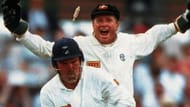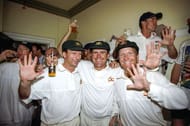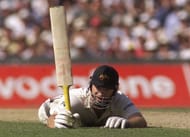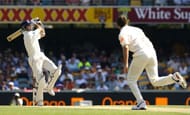
England, much to the disappointment of cricket fans all over the world, have surrendered The Ashes even before the Boxing Day Test could start. They have been whitewashed multiple times on Australian soil but there are occasions from the past which will probably give them hope of winning a Test in the ongoing series. Australia, over the years, once the series gets pocketed, has lost Test matches.
Let's chronicle the occasions when England won a Test or two towards the end of an Ashes series when the urn was already lost.
Ashes 1974-75:
In the first Test in Brisbane, Australia unleashed their new fast bowler Jeff Thomson. Adding to England's woes was the news that Dennis Lillee was fully fit after a serious back injury which threatened to end his career. The pitch at Woolloongabba was hastily prepared after a storm and Australia's fast men took full advantage of it. Tony Greig scored a fearless century but nothing else went right for England. Two very fast balls effected in Dennis Amiss breaking his thumb and John Edrich breaking his hand. Australia won by 166 runs as England only managed to score that many in their second innings.
In the Perth Test, England were forced to recall two 42-year olds: Colin Cowdrey and Fred Titmus. They batted well, and so too did Alan Knott, but could make no difference to the final outcome. Thomson picked up seven wickets, Greg Chappell held on to seven catches, and Australia won comfortably by 9 wickets. Thomson, besides taking all those wickets, caused further difficulties for England by inflicting agonising blows on Brian Luckhurst's hand and David Lloyd's abdomen.
On Boxing Day, Australia had put England in before 77,165 spectators. England still had no answers against Thomson's fast bowling and were all out for 242. Bob Willis did the damage when Australia batted.
He took a five-for as the hosts finished their first innings on 241. IN England's second innings, Dennis Amiss batted splendidly before being dismissed on 90, only two runs short of Bob Simpson's record aggregate of 1381 runs in Tests in a calendar year. England managed to score 244, thus setting Australia a target of 246 to win the third Test. It was very tense at times but the climax was reached when Australia needed 55 runs in the final hour with four wickets in hand.
The anticlimax soon followed: Marsh and Walker scoring only seven runs off seven overs from Underwood and Titmus. England took the new ball and Australia once again started to score freely. 14 were needed off the last 2 overs. Eventually, both played out the last over for a draw- Australia eight runs short and England two wickets away from victory.
There was startling news before the start of the fourth Test in Sydney: Mike Denness, the England captain, had dropped himself owing to poor form. Greg Chappell batted beautifully in both innings and Thomson continued picking up wickets as Australia set England a target of 400 to win the match in 8.5 hours.
John Edrich, the stand-in captain, had two ribs cracked from the first ball from Lillee on the last day, which forced him to the casualty ward. He returned, though, and held fast for a brave 33 not out. Fletcher was hit on the head and the Mallett took full advantage of the havoc created by Lille and Thommo. He picked up four cheap wickets as Australia won by 171 runs with 5.3 overs in hand. The record attendance of 178,027 witnessed Australia regain the Ashes, four years after losing them on the same ground.
The fifth Test in Adelaide was another walk in the park for Australia. Derek Underwood picked up eleven wickets but could not stop his team from going down by 163 runs. Lillee picked up eight wickets and helped his team complete a victory with much time to spare despite the first day being lost through rain.
Jeff Thomson went to play some tennis during the rest day of the fifth Test and injured his shoulder, thus making him unavailable for the final Test at Melbourne. Peter Lever blew off the Australian top order on a humid morning. He kept the ball up and let it swing at pace, much to the dismay of the Aussies. More good news were to follow for England as Lillee retired with a foot injury only after six overs in the England first innings. Max Walker toiled hard and picked up a 8-for but, overall, the bowling was pretty ordinary. England took a massive 377-run lead at the end of their first innings. Greg Chappell scored another fine century in Australia's second innings but could not help Australia avoid innings defeat. England had won a match at long last, weeks after surrendering the Ashes.
Dennis Lillee and Jeff Thomson created havoc as Australia won four out of the first five Tests. In the final Test of the series, England bounced back by registering an innings victory. Tony Greig's inspirational performance, aided by the solid batting of Mike Denness and Keith Fletcher, powered England to victory in a series in which almost nothing went right for them .
Ashes 1993-94

That ball spun across Mike Gatting to clip the off stump. It was his first ball in a Test in England. Before him, no bowler in Ashes history has hit the stumps with his maiden ball. That did have a psychological effect on the English batsmen. They surrendered against that guy Shane Warne and Merv Hughes as Australia won the opening Test by a whopping 179 runs.
The second Test at Lord's was the 15th Test in succession in which England failed to beat Australia, a new record at that time. Australia lost only four wickets in the entire match as England succumbed to an innings defeat. Warne was once again the destroyer-in-chief, with 8 wickets.
England came back strongly in the third Test at Nottingham. The highlight for them was a 23-year old Surrey left-hander named Graham Thorpe scoring a century on debut against Australia. England sensed victory on the final afternoon but was denied by a doughty stand between Steve Waugh and Brendon Julian. Australia led 2-0 with three Tests to go.
In the fourth Test at Headingley, Australia was once again back to their best. They lost only four wickets in the entire match and won by an innings and plenty.
Their 653-4 in the first innings was the highest total in any match at Headingley, thus breaking a 92-year old record. Allan Border scored an unbeaten double hundred, becoming the third Australian captain to score a double-century in England (Billy Murdoch and Bobby Simpson were the other two).
In the fifth Test, Mike Atherton became the youngest man to captain England at home against Australia. He won the toss and elected to bat but his team mates didn't respond to his call at all. Paul Reifell took six wickets as the hosts were dismissed for only 276.
Mark Waugh batted brilliantly in both innings as Australia won the match easily by 8 wickets. Of course, there was a small matter of Warne picking up another five-for. Ted Dexter, England's chairman of selectors, resigned at the end of this match.
England were absolutely down and out before the final Test began on August 19th at The Oval. They made five changes to their team that played at Edgbaston. They used a total of 24 players in the series while Australia used only 13. Angus Fraser and Steve Watkin picked up crucial wickets as England finally won a Test against Australia, their first since December 1986.
Australia won the series comfortably, but seemed to be a touch complacent once they knew the urn was theirs.
Ashes 1997-98

This Ashes started well for England. Australia were under-prepared and found themselves reeling at 54 for 8 at lunch on Day 1 of the first Test. England never let the advantage go and posted a huge first innings score of 478, courtesy a double century from Nasser Hussain and a century from Graham Thorpe.
Australia batted well in their second innings but had too much to do to avoid defeat, and they couldn't quite manage it. The only innings of note was a Greg Blewett century, which made him the first ever to score a century in each of his first three Ashes Tests.
The second Test at Lord's was influenced by bad weather. A lot of overs were lost and it resulted in a draw, but not before Glenn McGrath took 8 for 38 in the first innings, thus registering the third best figures by an Australian in an Ashes Test innings.
The third Test at Old Trafford was Steve Waugh's. No one barring Waugh and John Crawley (in England's second innings) found batting easy on that track. Waugh scored a century in each innings, the first to do so in an Ashes Test in 50 years. Warne took nine wickets and McGrath picked up seven of them to level the series at 1-1.
Australia were even more convincing in Headingley. Jason Gillespie took 7 for 37 in the first innings, thus registering the best figures by an Aussie on that ground. Matthew Elliott was dropped when he was on 29 and he made England pay heavily by adding another 170 runs to his first that score. Ricky Ponting scored his first Test century and Australia had it easy- a win by an innings and 61 runs.
The fifth Test at Trent Bridge was a must win game for England but they were on the backfoot on Day 1 when Mark Taylor won yet another toss and Australia batted solidly. Then, much to the delight of the trivia-huters, occured the unique sight of twins ( Mark and Steve Waugh) batting against brothers ( Adam and Ben Hollioake), all having been born in Australia.
The visitors won comfortably and became the first country to win five successive major Ashes series.
The final Test at The Oval proved to be a thriller. McGrath took 7 wickets in England's first innings as the hosts were bundled out for 180. It looked like the 4-1 margin was inevitable but then Phil Tufnell joined the party. He too took 7 wickets as Australia only managed a lead of 40 in their first innings.
There was no Reifell or Gillespie, but Michael Kasprowicz wasted no time in making this oppurtunity count as he took the third 7-for in the match to dismiss England for a paltry 163 in their second innings. Australia needed only 124 to win but there was more drama in store. Andrew Caddick joined Tufnell to bowl out the Aussies for 104. A consolation win for England perhaps, but it produced the best match of the series.
Ashes 2001-02

The first really compressed Ashes series as we entered the 21st century- five Tests in 54 days. England had injury woes and, on top of that, they missed too many catches as Australia drove home the advantage in the first Test by an innings and 118 runs. S. Waugh, Martyn and Gilchrist all scored centuries and Warne once again found himself among the wickets to make it easy for Australia.
Following Hussain's injury at Edgbaston, Atherton resumed as captain, Stewart and Butcher having declined. It didn't make much difference, as far as Australia were concerned. Gillespie and McGrath picked up 5-fors and Mark Waugh scored a classy century to give the visitors another comprehensive victory at Lord's.
The third test at Trent Bridge was no different. McGrath and Warne looked unplayable at times as Australia won the low-scoring affair by 7 wickets. A mere 30 days after the first ball of the series, Australia wrapped up The Ashes once more. It had taken no more than 11 days' play, some of them incomplete.
The fourth Test at Headingley was the 300th between the old enemies. The weather played a role but Australia's stand-in captain Adam Gilchrist should be lauded for making a bold declaration in their second innings, setting England a target of 315. Then Mark Butcher played one of the innings of the century to take England home by six wickets - their second-largest successful run chase in Ashes history after Melbourne 1928-29.
The fifth Test too was a memorable one. Steve Waugh made a comeback despite not being fully fit and proved a point or two by scoring a century. Warne took eleven wickets as Australia won by an innings and 25 runs. Justin Langer replaced Michael Slater at the top of the order and marked the beginning of an era- the Langer-Hayden juggernaut had started to roll.
Australia won the series 4-1.
Ashes 2002-03

Once again, English hopes of a series win down-under were swiftly dashed. Graham Thorpe and Darren Gough were absent, to the advantage of Australia, and the Hayden-Ponting duo used it to the fullest. Hayden scored centuries in each innings, and McGrath took his 100th wicket in Ashes Tests. England were bowled out for only 79 in their second innings to give Australia a victory by 384 runs.
In the second Test at Adelaide, Michael Vaughan scored a breathtaking century but none of his team mates reached 50 in either innings as Australia took control over proceedings fairly early in the match. Ricky Ponting's century once again signalled that he was entering the golden period of his career. Then,England batted poorly in their second innings to gift Australia an innings victory.
The Perth Test was no different. England had no idea how to bat on the fast and bouncy track against the Australian fast bowlers. They succumbed to another innings defeat. It once again took the holders only 11 days to retain The Ashes.
More misery awaited England during the Boxing Day Test at Melbourne. Langer and Hayden scored freely as all four front-line English bowlers conceded over 100 runs in their first innings. England's response without the injured Stewart was feeble. Vaughan scored another classy century in the second innings but could not stop Australia going 4-0 up in the series.
At Sydney, despite not having the services of McGrath and Warne, Australia wanted to emulate their 1920-21 team in winning all five Tests.Steve Waugh scored a memorable career-saving century but great knocks from Mark Butcher and Michael Vaughan put England in a very comfortable position when Australia were to bat for the second time in the match . They were set a target of 452 to get the 5-0 whitewash but Caddick took seven wickets to stop Australia's reply at exactly the halfway stage. Once again England had won an Ashes Test when it didn't matter anymore.
Honourable mentions:
Ashes 1902: In that glorious summer of cricket in England, Victor Trumper, Clem Hill and Hugh Trumble gave the visitors an unassailable 2-0 lead with one Test to go. Then, in the final Test, Gilbert Jessop played one of the finest innings in the history of the game before George Hirst and Wilfred Rhodes helped England scamper home by one wicket.
Ashes 1924-25: Australia won the first three Tests comfortably before England won the fourth one, only to lose the fifth Test once again, and that too by a huge margin. It was a high-scoring series where, in the first four Tests, the first innings was always in excess of 400 runs.
Ashes 1950-51: Jack Iverson's mystery spin took care of most English batsmen during the first four Tests. Australia won all of them but England, rather unexpectedly, won the final Test of the series when Alec Bedser and Reg Simpson emerged as unlikely heroes.
So, all is not lost for England. Australia have a tendency of losing Ashes Tests after securing the urn.
Follow IPL Auction 2025 Live Updates, News & Biddings at Sportskeeda. Get the fastest updates on Mega-Auction and cricket news
